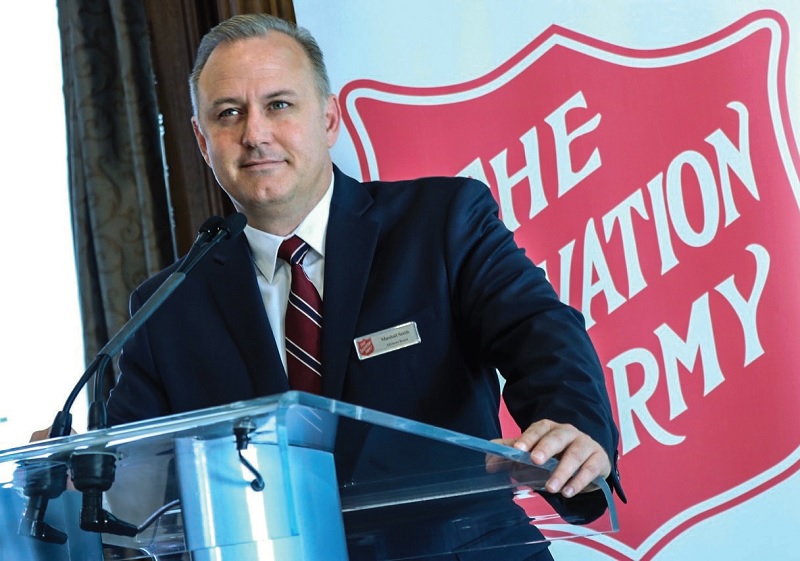Smith’s expertise in the field of substance-abuse disorder and related public policy is unrivalled. A sought-after speaker and consultant, his findings have been shared at international conferences throughout the world.
Now a member of The Salvation Army’s advisory board in British Columbia, he shared his insights recently with the Army’s territorial social services department, ministry units across the territory and the National Advisory Board:
What is the biggest challenge facing our addiction care system in Canada?
The fact that we don’t have one. There is no addiction care system in this country. You hear all the time that the system is broken. It’s not broken. It just doesn’t exist. What we have is a patchwork of service providers, all of them doing good work in their own areas, but there is no system in the sense that there is no unified strategy in place or formal interaction between them.
If I have a heart scare, to use another chronic illness as an example, once I get to the hospital, there’s a well-articulated pathway that the health-care system is going to guide me through. There’s immediate testing, assessment and evaluation. A team of physicians, nurses and other health-care providers are going to come in and make recommendations. I’ll be efficiently moved through a system of care.
That doesn’t exist with addiction at all. In fact, the opposite occurs. You’re more likely to be kicked out of the ER for showing symptoms of your illness.
Part of the problem is stigma. Let’s face it: addicts don’t behave very well when they’re using.
We have to have an honest conversation with ourselves about what addiction looks like and how we’re going to manage people with an illness who are combative, who don’t believe they have a problem and who are not behaving in a way that is consistent with society’s expectations.
What other obstacles do people with addictions face?
Not only are we lacking a nationwide system but what there is varies in access and quality. At one end, people with means and privilege are swaddled with the best care available: doctors, psychiatrists, long continuums of care from primary treatment to second-stage housing to continuing care in the community and monitoring with their employer.
“You hear all the time that the addiction care system is broken. It’s not broken. It just doesn’t exist.”At the other end of the spectrum, we have those who don’t have the means to access health care. They have to apply for welfare or social services, and perhaps sell whatever assets they have. The welfare-based portal required for addicts to enter the health-care system is inadequate, stigmatizing and barriered. It’s designed to keep people off of the welfare roll.
Then, in the middle and probably most alarming to me, is the constituency of people who can’t afford addiction care but don’t qualify for welfare. They’re probably working two jobs. They’re a paycheque away from being homeless. And it’s difficult to convince them they have a problem in the first place, let alone that they should take up arms to fight for their right to addiction care. So they continue to get sicker and sicker until their disease progresses to a point where they lose their job or their home and fall into the welfare system.
I believe in a system where it doesn’t matter what treatment provider you have—if you show up for addiction treatment, you hand in your health-care card and in you go.
What are we doing about the fentanyl crisis in Canada?
I don’t talk about this in terms of a fentanyl crisis. This is an addiction crisis. It’s a crisis of people and it’s a crisis of community. Scapegoating fentanyl for all of our failings as a community is irresponsible and is not going to get us to where we need to go.
Fentanyl use and addiction is happening in homes, businesses, schools, workplaces and universities, not just in the inner-city back alleys that the media so often portrays. That reality, and those who are addicted on the streets, are a small percentage of the overall substance-using population. The vast majority of the addiction problem in our communities is going on behind closed doors.
Are there other myths out there?
Groups that are doing good work, such as The Salvation Army, need to be more assertive. A prevailing social work mantra is “We meet them where they’re at.” But the other piece of that should be “And take them where they need to go.”
We need to be more assertive in helping people along a pathway, especially if they don’t even know that there is a pathway.
As well, people often say that addicts need to hit rock bottom before help will be effective. That’s simply not true. Addicts don’t need to want help in order for help to be effective. And help may not be effective on the first go, or the second, or the third. But every time we initiate help, they learn and grow and discover pathways to recovery.
Is there a role for faith-based organizations in the war against substance abuse?
There’s a huge role. When we asked people why they went into recovery, 22 per cent of respondents said that they wanted to make changes in their life to improve their spiritual condition. But when we asked people their reasons for maintaining their recovery, 45 per cent—more than double—replied that they wanted to maintain a heightened state of spiritual connection, which underscores how important faith-based groups are to the recovery process.
What can The Salvation Army do?
The Salvation Army makes an incredible difference all across Canada and Bermuda, there’s no question of that. What the Army needs to do more of is put that shingle in the window, that you have programs that specialize in grief and drug addiction, that you’re in communities, large and small. And keep modernizing and evolving your addiction services and programs.
What is your dream?
Addiction disease impacts everybody in different ways. It’s as unique as a fingerprint, with different combinations of challenges.
We need a full continuum of services, ranging from harm reduction on one end right through to an abstinence-based recovery focus on the other, and everything in between. People should be able to enter that continuum where they’re at, and move back and forth along that continuum as the risk in their life presents itself.
And we have to be there for them in a non-judgmental way, to help get them connected with the services that are going to work for them where they’re at.










Hard to believe this is the same guy spouting nonsense on Aaron Gunn's Movies. Obviously if he was an idiot he would not get the swank jobs he does, and here we have him speaking very intelligently and eloquently.